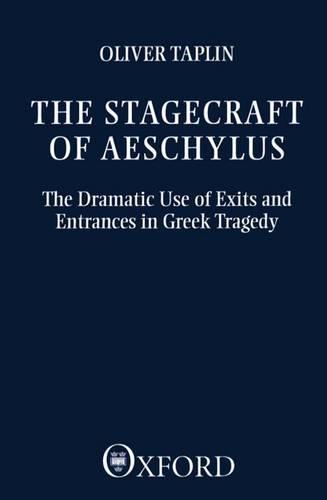Overview
The visual effect of the staging of Aeschylus' plays was an essential part of their impact. And yet all that survives today are the scripts. Imagination, helped by anachronistic sources, has played the chief role for those dealing with the dramaturgy of Aeschylus' works, and the result has usually been stages crowded with extras and equipment.In this book, the author approaches the subject from a completely different angle. He clears the stage and looks for clues of Aeschylus' stagecraft in the texts of the plays themselves. He concentrates his study in an analysis of the exits and entrances in Aeschylus' works with constant reference to the practice of Sophocles and Euripides as well. His arguments and conclusions are fascinating and thought-provoking, and make the book indispensable for anyone interested in ancient Greek drama and its staging.
Full Product Details
Author: Oliver Taplin (University Lecturer in Greek and Latin Literature at Oxford, and Tutorial Fellow, University Lecturer in Greek and Latin Literature at Oxford, and Tutorial Fellow, Magdalen College)
Publisher: Oxford University Press
Imprint: Clarendon Press
Edition: New edition
Dimensions:
Width: 13.90cm
, Height: 3.00cm
, Length: 21.50cm
Weight: 0.629kg
ISBN: 9780198144861
ISBN 10: 0198144865
Pages: 518
Publication Date: 26 October 1989
Audience:
Professional and scholarly
,
Professional & Vocational
Format: Paperback
Publisher's Status: Active
Availability: To order

Stock availability from the supplier is unknown. We will order it for you and ship this item to you once it is received by us.
Reviews
'A fascinating commentary. Every controversial passage (and there are many) is discussed with incisive intelligence, great learning, and also good-humoured respect for opposing views.' Bernard Knox, Times Literary Supplement 'Dr Taplin has made Greek tragedy more vivid and more accessible to us all, to the professional classicist, to the historian of the stage, and to would-be performers of ancient drama. Mark Griffith, Phoenix 'This substantial and original work of scholarship is essential for anyone who wants to gain a serious understanding of Greek tragedy in performance. It is the combination of the attempted reconstruction of the stage-action with sustained, perceptive reading of the plays in the light of this reconstruction that gives this study its specific value.' Christopher Gill, University of Exeter, Theatre Research International Autmun '90
[This] is a fascinating commentary. Every controversial passage (and there are many) is discussed with incisive intelligence, great learning and also good-humored respect for opposing views; from the entry of the chorus in Persians to the final processional exeunt of Eumenides every important exit and entrance (real or imagined) provides the cue for an essay which, firmly based on the principles enunciated in the first chapter, enlightens and stimulates the reader. --Bernard Knox, Times Literary Supplement Taplin has made Greek tragedy more vivid and more accessible to us all, to the professional classicist, to the historian of the stage, and to would-be performers of ancient drama. He deserves our thanks and congratulations. --Mark Griffith, Phoenix
[This] is a fascinating commentary. Every controversial passage (and there are many) is discussed with incisive intelligence, great learning and also good-humored respect for opposing views; from the entry of the chorus in Persians to the final processional exeunt of Eumenides every important exit and entrance (real or imagined) provides the cue for an essay which, firmly based on the principles enunciated in the first chapter, enlightens and stimulates the reader. --Bernard Knox, Times Literary Supplement<br> Taplin has made Greek tragedy more vivid and more accessible to us all, to the professional classicist, to the historian of the stage, and to would-be performers of ancient drama. He deserves our thanks and congratulations. --Mark Griffith, Phoenix<br>
<br> [This] is a fascinating commentary. Every controversial passage (and there are many) is discussed with incisive intelligence, great learning and also good-humored respect for opposing views; from the entry of the chorus in Persians to the final processional exeunt of Eumenides every important exit and entrance (real or imagined) provides the cue for an essay which, firmly based on the principles enunciated in the first chapter, enlightens and stimulates the reader. --Bernard Knox, Times Literary Supplement<br> Taplin has made Greek tragedy more vivid and more accessible to us all, to the professional classicist, to the historian of the stage, and to would-be performers of ancient drama. He deserves our thanks and congratulations. --Mark Griffith, Phoenix<br>



